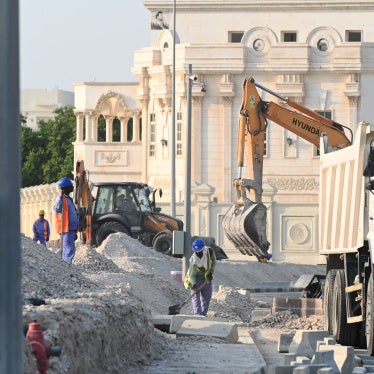Most Yemenis were at home taking their afternoon siesta when Belkis Wille, Human Rights Watch's Yemen researcher, walked into the shop in Haradh for the meeting she had arranged with Nadim. The shop owner, a friend of Nadim’s, took her to the back office to wait. The heat in the dusty desert town was stifling, and the shop was hardly better – Haradh had almost no electricity, and air conditioning wasn’t an option. Shortly after Belkis arrived, a round man in his 40s walked through the door. He stood with his back to her, shifting his weight from one foot to the other. He seemed nervous, glancing frequently around the room.
Nadim (not his real name) had reason for both the jangled nerves and the caution. His line of business – human trafficking – meant that meeting with Belkis put him in peril.
“This could cost me my life,” he said. “If the other traffickers find out that I am talking to you, they will kill me.”
Each year, thousands of people flee the extreme poverty and repression in the Horn of Africa to Yemen, hoping to go on to Saudi Arabia for work. In Haradh, many migrants sleep in the town square, a large expanse of parched earth littered with rotten mattresses. Many migrants fall into the hands of human traffickers who torture them to extort money from their families back home.
Like other traffickers Belkis interviewed in Yemen, Nadim said he “helped” migrants to reach Saudi Arabia safely. Nadim defined his role as the negotiator between their families and other traffickers. Sometimes migrants refuse to ask their family for money, or the family refuses to pay, he said. Nadim calls the relatives and persuades them that he has their loved one’s “best interests at heart.” Then he negotiates the price between the family and the traffickers. He used the derogatory Arabic terms “criminals” and “bad guys” to refer to other traffickers, insisting he always treated migrants well, never torturing them as others did.
But according to the new Human Rights Watch report, “Yemen’s Torture Camps,” traffickers, with the complicity of local officials, hold migrants in camps and abuse them to squeeze money from their painfully poor families. This brings in large sums of money to Yemen, the Middle East’s poorest country. Migrants told Belkis that their families and friends paid ransoms from US$200 to more than $1,000 for their freedom.
The report documents the existence of torture camps near Haradh. The area is a relatively short drive from both the Red Sea coast and the Saudi border, making it a key smuggling hub – both for people and for goods. As the sun sets, the sound of truck traffic increases to a pervasive hum as even more smuggling vehicles drive through the town. On the main road from the coastal town of Hodaida to Haradh, various Yemeni security agencies and officials at checkpoints allow the trafficking to flourish with little interference.
In the coming weeks, Yemen’s parliament is scheduled to debate an anti-trafficking bill. This important bill could enhance the protection of migrants and make it easier to prosecute traffickers and complicit officials.
While Nadim never admitted to any crimes, he was quick to recount abuses committed by other traffickers.
He described the boat crews that brought migrants over the Red Sea, and how the crews were in touch by phone with gangs in Yemen. He also described how traffickers would “buy” migrants from securityand military officers at checkpoints. They would charge migrants between $300 and $450 on the promise of bringing them to Saudi Arabia. Then they’d bring the migrants back to their camps and torture them.
He said he watched one trafficker force migrants to eat large quantities of watermelon and drink water, then tie their penises so they couldn’t urinate. He’d seen a trafficker chop off a migrant’s fingers, and described how traffickers would shove chairs on top of migrants, who were contorted underneath in various stress positions, then sit on the chairs.
Other people Belkis interviewed revealed additional abuses. Beatings were commonplace. One man described watching as a trafficker gouged another man’s eyes out with a water bottle. Another said that traffickers hung him by wire wrapped around his thumbs. Aid workers said they saw signs of abuse on migrants consistent with their accounts of traffickers ripping off fingernails or branding them with irons. Belkis heard of some traffickers who raped women migrants and others who tortured migrants to death.
Nadim, his back still turned, looked nervously over his shoulder when Belkis asked him which Haradh officials needed to be paid off. “If you didn’t want to go to prison, who would you pay off?” she asked. “If you didn’t want your camp raided, who would you pay off?”
When Belkis asked Nadim for names of top traffickers he knew, along with the locations of their camps, he rattled off a list of people. Nadim even listed the checkpoints where other traffickers “purchased” migrants from security officers.
At this point, the door opened and two other traffickers walked into the shop to make a purchase. Belkis and Nadim fell silent, then quickly pretended to be discussing items in the shop. After the other traffickers left, Nadim, noticeably rattled, waited for a few minutes and then slipped out of the shop, disappearing into the street.


